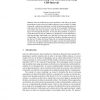Free Online Productivity Tools
i2Speak
i2Symbol
i2OCR
iTex2Img
iWeb2Print
iWeb2Shot
i2Type
iPdf2Split
iPdf2Merge
i2Bopomofo
i2Arabic
i2Style
i2Image
i2PDF
iLatex2Rtf
Sci2ools
113
Voted
CPAIOR
2010
Springer
2010
Springer
Constraint Reasoning with Uncertain Data Using CDF-Intervals
Interval coefficients have been introduced in OR and CP to specify uncertain data in order to provide reliable solutions to convex models. The output is generally a solution set, guaranteed to contain all solutions possible under any realization of the data. This set can be too large to be meaningful. Furthermore, each solution has equal uncertainty weight, thus does not reflect any possible degree of knowledge about the data. To overcome these problems we propose to extend the notion of interval coefficient by introducing a second dimension to each interval bound. Each bound is now specified by its data value and its degree of knowledge. This is formalized using the cumulative distribution function of the data set. We define the formal framework of constraint reasoning over this cdf-intervals. The main contribution of this paper concerns the formal definition of a new interval arithmetic and its implementation. Promising results on problem instances demonstrate the approach.
Related Content
| Added | 19 Jul 2010 |
| Updated | 19 Jul 2010 |
| Type | Conference |
| Year | 2010 |
| Where | CPAIOR |
| Authors | Aya Saad, Carmen Gervet, Slim Abdennadher |
Comments (0)

